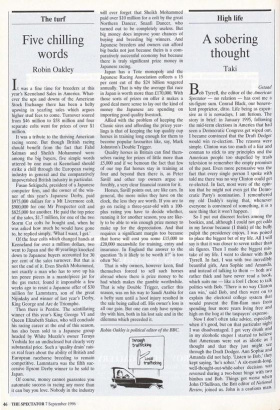The turf
Five chilling words
Robin Oakley
It was a fine time for breeders at this year's Keeneland Sales in America. What- ever the ups and downs of the American Stock Exchange there has been a hefty upswing in yearling sales which argues higher stud fees to come. Turnover soared from $46 million to $58 million and four separate colts went for prices of over $1 million.
It was a tribute to the thriving American racing scene. But though British racing should benefit from the fact that Fand Selman and Sheikh Mohammed were among the big buyers, five simple words uttered by one man at Keeneland should strike a chill through the European racing industry in general and the comparatively impoverished British industry in particular. Fusao Sekiguchi, president of a Japanese computer firm, and the owner of the win- ner of this year's Japanese Derby, paid $975,000 dollars for a Mt Livermore colt, $900,000 for one Mr Prospector colt and $825,000 for another. He paid the top price of the sales, $1.7 million, for one of the two Storm Cat colts he bought and, when he was asked how much he would have gone to, he replied simply, 'What I want, I get.' Of the four colts which changed hands at Keeneland for over a million dollars, two went to Japan and the 40 yearlings knocked down to Japanese buyers accounted for 30 per cent of the sales turnover. But that is not the end of it. Even Sheikh Mohammed, not exactly a man who has to save up his ten pence pieces in a mantelpiece jar for the gas meter, found it impossible a few weeks ago to resist a Japanese offer of $30 million for Lammtarra, son of the great Nijinksky and winner of last year's Derby, King George and Arc de Triomphe.
Then there is Pentire. The scintillating winner of this year's King George VI and Queen Elizabeth Stakes, who will conclude his racing career at the end of this season, has also been sold to a Japanese group headed by White Muzzle's owner Teruya Yoshida for an undisclosed but clearly very substantial price. Such a 'quality drain' rais- es real fears about the ability of British and European racehorse breeding to remain competitive. Lammtarra was the fifth suc- cessive Epsom Derby winner to be sold to Japan.
Of course, money cannot guarantee you automatic success in racing any more than it can buy you love. Nobody in the industry will ever forget that Sheikh Mohammed paid over $10 million for a colt by the great Northern Dancer, Snaafi Dancer, who turned out to be completely useless. But big money does improve your chances of buying and breeding big winners. And Japanese breeders and owners can afford big bucks not just because theirs is a com- paratively successful economy but because there is truly significant prize money in Japanese racing.
Japan has a Tote monopoly and the Japanese Racing Association collects a 15 per cent cut of the $24 billion wagered annually. That is why the average flat race in Japan is worth more than £170,000. With those sorts of prizes on offer it makes a good deal more sense to lay out the kind of money the Japanese are spending on importing good quality livestock.
Allied with the problem of keeping the Classic sires and affording the pricey year- lings is that of keeping the top quality cup horses in training long enough for them to become popular favourites like, say, Mark Johnston's Double Trigger.
Quality horses in Britain can find them- selves racing for prizes of little more than £5,000 and if we bemoan the fact that few of our top flat horses stay in training at four and beyond then there is, as Peter Savill and other top owners argue so forcibly, a very clear financial reason for it.
Horses, Savill points out, are like cars. In general, the more miles they have on the clock, the less they are worth. If you are to go on racing a three-year-old with a 100- plus rating you have to decide whether, running it for another season, you are like- ly to be able to win enough prize money to make up for the depreciation. And that requires a significant margin too because that horse will cost you some £15,000 to £20,000 meanwhile for training, entry and insurance. In England the answer to the question 'Is it likely to be worth it?' is too often 'No'.
That is why owners, however keen, find themselves forced to sell such horses abroad where there is prize money to be had which makes the gamble worthwhile. That is why Double Trigger, earlier this season, was on his way to Saudi Arabia for a hefty sum until a hoof injury resulted in the sale being called off. His owner's loss is all our gain. But one can only have sympa- thy with him, both in his lost sale and in the dilemma which preceded it.


























































 Previous page
Previous page